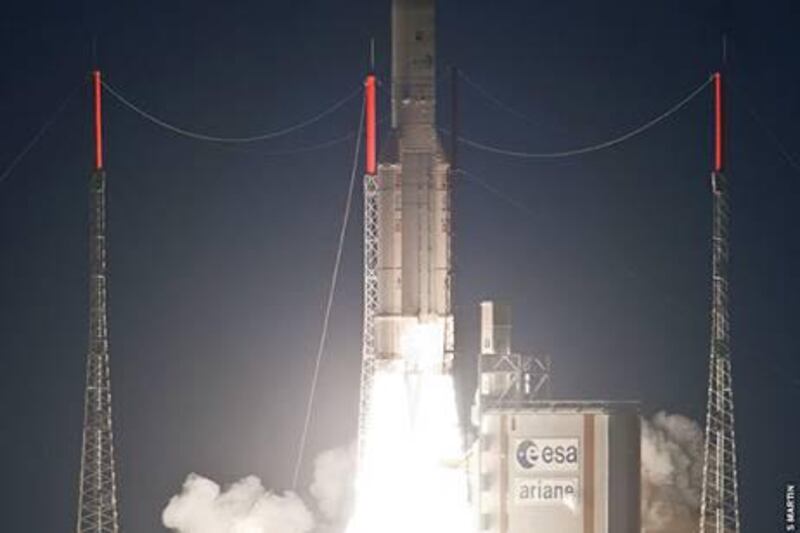ABU DHABI // The launch of Yahsat's first commercial telecommunications satellite, part of a Dh4.4 billion investment, marks a major step in this emirate's aim to diversify its economy and become a regional hub in technology and communications.
The Y1A satellite, which lifted off from French Guiana yesterday morning, will provide commercial TV and broadband internet to more than 20 countries in Africa, Asia and the Middle East. A second satellite, the Y1B, will be launched later this year.
Yahsat, or Al Yah Satellite Communications Co, is owned by Mubadala Development, a strategic investment company controlled by the Abu Dhabi Government. Abu Dhabi has been pouring resources into the expansion of several industries to shift its economy away from oil, a move that is a major component of its Economic Vision 2030 plan.
The launch will represent "a significant step forward for Abu Dhabi's economic diversification and growth," said Jassem al Zaabi, Yahsat's chief executive.
With a focus on developing the aviation, pharmaceuticals, tourism, health, transport, media, financial and telecommunications sectors, the emirate has looked to educational institutions and corporations to train Emiratis and build local capacity.
The emirate's government also has a majority stake in the Thuraya satellite telephone company. Aabar Investments, also government owned, holds a 32 per cent stake in Virgin Galactic, the world's first commercial space flight firm. Abu Dhabi could even serve as a launch venue if Virgin Galactic opts to build one in the region.
The Abu Dhabi space programme comes amid similar efforts in neighbouring Dubai, which has also recognised the financial potential of satellite technology. It launched the remote sensing and imaging satellite DubaiSat-1 in 2009 and has plans for two more in the next five years.
"The developments here in space and technology are all happening very fast and Yahsat is a huge step for achieving that goal for the country," said Salem al Marri, the space programme director at the Emirates Institution for Advanced Science and Technology, which operates DubaiSat-1.
Yahsat's satellite was built in Europe by the corporate consortium of EADS Astrium, Thales and Alenia Space. The Y1A was originally scheduled to go into orbit early last year but was delayed after an earthquake damaged a manufacturing plant in Italy.
The launch aboard the Ariane 5 ECA rocket, originally scheduled for early Thursday UAE time, was also postponed due to technical issues. After about nine days and a series of adjustments by engineers, the satellite will reach its orbit about 36,000 kilometres above the equator. It is expected to travel around the planet for 15 years at a speed of 3.07 kilometres per second, the same speed as Earth's rotation.
Inside mission control at Al Falah, about a half-hour drive outside the capital, engineers will monitor an endless stream of flight and equipment data in the centre's main operations room. About half of the centre's team are Emiratis.
The object of their attention is sizeable by any standard. Weighing 6 tonnes, with a wingspan of 30 meters once it is unfurled - about the length of a blue whale - the Y1A has become one of the biggest geostationary satellites in orbit, said Martin Gee, the Yahsat chief technology officer.
Half a dozen 9m antennas will connect the satellite and beam up the instructions to offer commercial television and internet feeds through its service partners. The satellite will also provide military and government communications to subscribing nations and Yahsat has secured a contract with the UAE Armed Forces.
Civilians will also benefit as millions of underserved people and organisations will be able to access broadband and phone services, which Yahsat says will be available for the same cost as terrestrial services.
This article has been amended since its original publication. The second satellite, the Y1B, will be launched later this year, not in the first quarter of next year as we originally reported.






